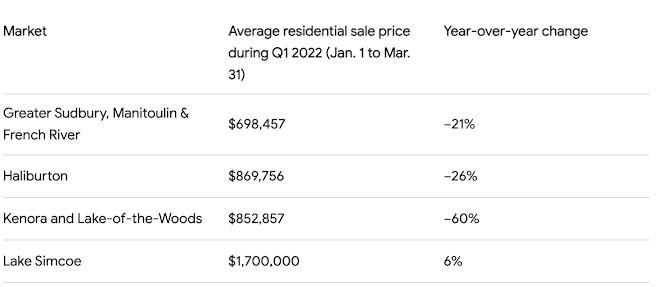Experts predict that restricted supply will result in single-digit price rises later this year, despite the fact that demand is about half what it was during the pandemic mania.
This spring saw a fall in Ontario cottage prices, but real estate experts advise buyers to act quickly.
According to Re/Max Canada's annual cottage trends study, average sale prices fell from five to sixty percent in the first quarter of this year compared to last. The biggest decreases from the previous year were observed in Kenora and Lake-of-the-Woods, Peterborough and the Kawarthas, and Haliburton.
According to Christopher Alexander, president of Re/Max Canada, the cottage market is once again experiencing its March-to-November seasonal bustle.
“The two years of pandemic busyness has tapered off,” he said. “We’ve been in a normal cycle for a good year now.”
The significant price decline, according to Royal LePage President Phil Soper, is the result of a cottage market correction that was delayed.
“The market correction ended in the city around the end of March,” Soper said. “It took awhile longer in cottage country because there doesn’t tend to be a lot of activity after the spring market.”
He claimed that the worst of the recession is behind us and that coming forward, prices in cottage country will begin to gradually rise. In the horseshoe area surrounding Toronto, properties on well-liked lakes are already drawing numerous offers.
“The demand, although it’s half of what it was during the pandemic craze, is still there,” Soper said. “It is outpacing the very limited amount of properties we have for sale, which is again pushing prices up.”
He expects single-digit price rises, mostly in the category of "medium-priced" cottages listed for roughly a million dollars, even though lower inventory will result in lower sales.
According to Alexander, the low inventory is probably the result of hesitation brought on by the high interest rate environment.
“People have been reluctant to list,” he said, adding that many locked in on record-low rates in 2020 and 2021.
Another constraint mentioned by Alexander is the transfer of wealth through generations:
“Long-term cottagers are putting their properties in trusts or they’re passing it to the next generation.”
Broker Greg Kirby of Kenora reported that he is finding the summer to be a little busy than he had anticipated.
“I was predicting (last) November that 2023 would be soft, and it hasn’t been,” he said.
He anticipates selling about 40 properties this year, about the same as in the years before to the pandemic.
“We’re in what I describe as a pretty balanced market,” he said.
According to a Re/Max report from April, the first quarter sale prices in Kenora and Lake-of-the-Woods decreased by 59% year over year, the greatest percentage in not only the province but the entire country. Haliburton and Peterborough and the Kawarthas lagged behind with price drops of 26% and 31%, respectively.
Alexander said, “The markets that bounced up the most seem to have fallen the most.” “People can get on an airplane again and go overseas to a variety of places they couldn’t during the (early) pandemic.”
According to Alexander, these areas saw some of the biggest rises during the pandemic and are now returning to normal as more people are travelling.
According to Philip Cross, an economist and senior fellow at the Macdonald-Laurier Institute, any additional decline in cottage prices will be based on how people respond to prospective interest rate increases.
Cross remarked that the cottage market will benefit less from people working from home this year. Additionally, the cottage market will only be accessible to a few number of affluent people because they are typically secondary discretionary expenditures.
Alexander claimed that the worst of the price declines in the market for recreational properties had already passed, regardless of upcoming interest rate hikes and pauses.
source: https://www.thestar.com/real-estate/2023/07/12/that-cottage-price-nosedive-its-behind-us-as-prices-trend-back-up.html


